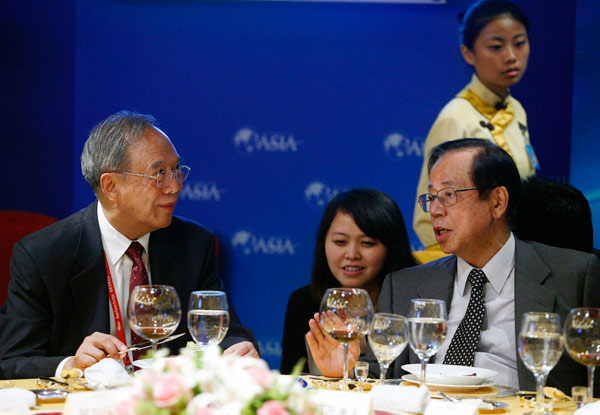Asian countries 'should boost ties'
Updated: 2013-04-09 07:13
By Ding Qingfen in Boao, Hainan (China Daily)
|
||||||||
Head of leading Chinese think tank urges more investment in infrastructure
Asian countries led by China should work together to boost infrastructure investment and strive for sustainable and stable economic growth in the continent, the head of China's top think tank said on Monday.
Zeng Peiyan, chairman of the China Center for International Economic Exchanges and a former vice-premier, called for the launching of the Asia Infrastructure Cooperation Initiative at the annual conference of the Boao Forum for Asia.
 |
|
Zeng Peiyan (left), chairman of the China Center for International Economic Exchanges, speaks with former Japanese prime minister Yasuo Fukuda at the Boao Forum for Asia on Friday. Zhang Hao / For China Daily |
He called on Asian countries to enhance cooperation on improving infrastructure and setting up a multilateral financial institution tailored for Asian infrastructure projects.
Asian economies have turned into an increasingly important driver of global economic recovery due to their fast growth, but the region, which is heavily reliant on external demand, has to accelerate structural reforms while the eurozone debt crisis continues to affect Asian exporters.
"Asia must implement transformation through expanding spending on infrastructure to foster a new economic growth engine," said Zeng.
While the global economic recovery remains fragile, Asian countries are accelerating steps to integrate their economies.
China and South Korea started talks on a bilateral free-trade agreement last year, and China, South Korea and Japan recently started the first round of negotiations on a trilateral FTA.
Some Asian countries have already increased infrastructure spending. The Indonesian government plans to increase the ratio of public spending to GDP to 15 percent in 2013. The Philippine government plans to boost its investment in infrastructure by 19 percent in 2013. In August, heads of ASEAN nations pledged to increase investment from Chinese companies in their infrastructure projects.
Zeng called on Asian economies to enhance exchanges and cooperation on infrastructure construction guidelines, reach consensus on building a regional infrastructure network and launch a long-term infrastructure arrangement for the region, based on their own plans.
Zeng's remarks came a day after President Xi Jinping urged Asian economies to strengthen cooperation to generate prosperity in the region and the rest of the world, saying that Asia is the engine of global economic recovery.
In 2012, Asian economies accounted for half of global GDP growth.
But Zeng warned of the risks of raising funds for the infrastructure initiative.
"Such a big program needs a huge amount of capital. Some economies probably cannot do this," he said.
According to the Asian Development Bank, from 2010 to 2020, an infrastructure fund with as much as $8 trillion is needed in Asia to help sustain economic growth.
"Establishing a multilateral financial organization is a pressing task," said Zeng.
"It should be open to Asian governments as well as private capital from within and outside the region," he added.
Sectors that are closely related to people's livelihoods, including transportation, energy, telecoms and ecological protection, should be prioritized when it comes to the allocation of the fund, he said.
Zheng Xiaosong, assistant minister of finance, said the Chinese government is looking into the possibility of such a fund.

 Li Na on Time cover, makes influential 100 list
Li Na on Time cover, makes influential 100 list
 FBI releases photos of 2 Boston bombings suspects
FBI releases photos of 2 Boston bombings suspects
 World's wackiest hairstyles
World's wackiest hairstyles
 Sandstorms strike Northwest China
Sandstorms strike Northwest China
 Never-seen photos of Madonna on display
Never-seen photos of Madonna on display
 H7N9 outbreak linked to waterfowl migration
H7N9 outbreak linked to waterfowl migration
 Dozens feared dead in Texas plant blast
Dozens feared dead in Texas plant blast
 Venezuelan court rules out manual votes counting
Venezuelan court rules out manual votes counting
Most Viewed
Editor's Picks

|

|

|

|

|

|
Today's Top News
Boston bombing suspect reported cornered on boat
7.0-magnitude quake hits Sichuan
Cross-talk artist helps to spread the word
'Green' awareness levels drop in Beijing
Palace Museum spruces up
First couple on Time's list of most influential
H7N9 flu transmission studied
Trading channels 'need to broaden'
US Weekly

|

|







